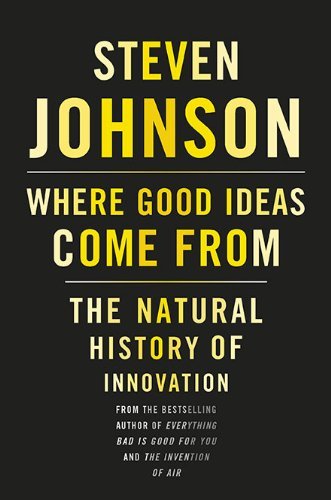[Steven Johnson] Where Good Ideas Come From The .epubseeders: 18
leechers: 1
[Steven Johnson] Where Good Ideas Come From The .epub (Size: 506.31 KB)
Description
Page Numbers Source ISBN: B0043XYN4E
Publisher: Riverhead; Reprint edition (October 5, 2010) Language: English ASIN: B003ZK58TA  Publication Date: October 5, 2010 The printing press, the pencil, the flush toilet, the battery--these are all great ideas. But where do they come from? What kind of environment breeds them? What sparks the flash of brilliance? How do we generate the breakthrough technologies that push forward our lives, our society, our culture? Steven Johnson's answers are revelatory as he identifies the seven key patterns behind genuine innovation, and traces them across time and disciplines. From Darwin and Freud to the halls of Google and Apple, Johnson investigates the innovation hubs throughout modern time and pulls out the approaches and commonalities that seem to appear at moments of originality. From Publishers Weekly Johnson--writer, Web guru, and bestselling author of Everything Bad Is Good for You--delivers a sweeping look at innovation spanning nearly the whole of human history. What sparks our great ideas? Johnson breaks down the cultural, biological, and environmental fuel into seven broad "patterns," each packed with diverse, at times almost disjointed anecdotes that Johnson synthesizes into a recipe for success. A section on "slow hunches" captivates, taking readers from the FBI's work on 9/11 to Google's development of Google News. A section on error takes us through a litany of accidental innovations, including the one that eventually led to the invention of the computer. "Being right keeps you in place," Johnson reminds us. "eing wrong forces us to explore." It's eye-opening stuff--although it does require an investment from the reader. But as fans of the author's previous work know, an investment in Johnson pays off, and those who stick with the author as he meanders through an occasional intellectual digression will come away enlightened and entertained, and with something perhaps even more useful--how to recognize the conditions that could spark their own creativity and innovation. Another mind-opening work from the author of Mind Wide Open. (Oct.) (c) Copyright © PWxyz, LLC. All rights reserved. From Booklist The figure of the lone genius may captivate us, but we intuit that such geniuses’ creations don’t materialize in a vacuum. Johnson supported the intuition in his biography of eighteenth-century scientist Joseph Priestly (The Invention of Air, 2009) and here explores it from different angles using sets of anecdotes from science and art that underscore some social or informational interaction by an inventor or artist. Assuring readers that he is not engaged in “intellectual tourism,” Johnson recurs to the real-world effects of individuals and organizations operating in a fertile information environment. Citing the development of the Internet and its profusion of applications such as Twitter, the author ascribes its success to “exaptation” and “stacked platforms.” By which he means that curious people used extant stuff or ideas to produce a new bricolage and did so because of their immersion in open networks. With his own lively application of stories about Darwin’s theory of atolls, the failure to thwart 9/11, and musician Miles Davis, Johnson connects with readers promoting hunches and serendipity in themselves and their organizations. --Gilbert Taylor Sharing Widget |